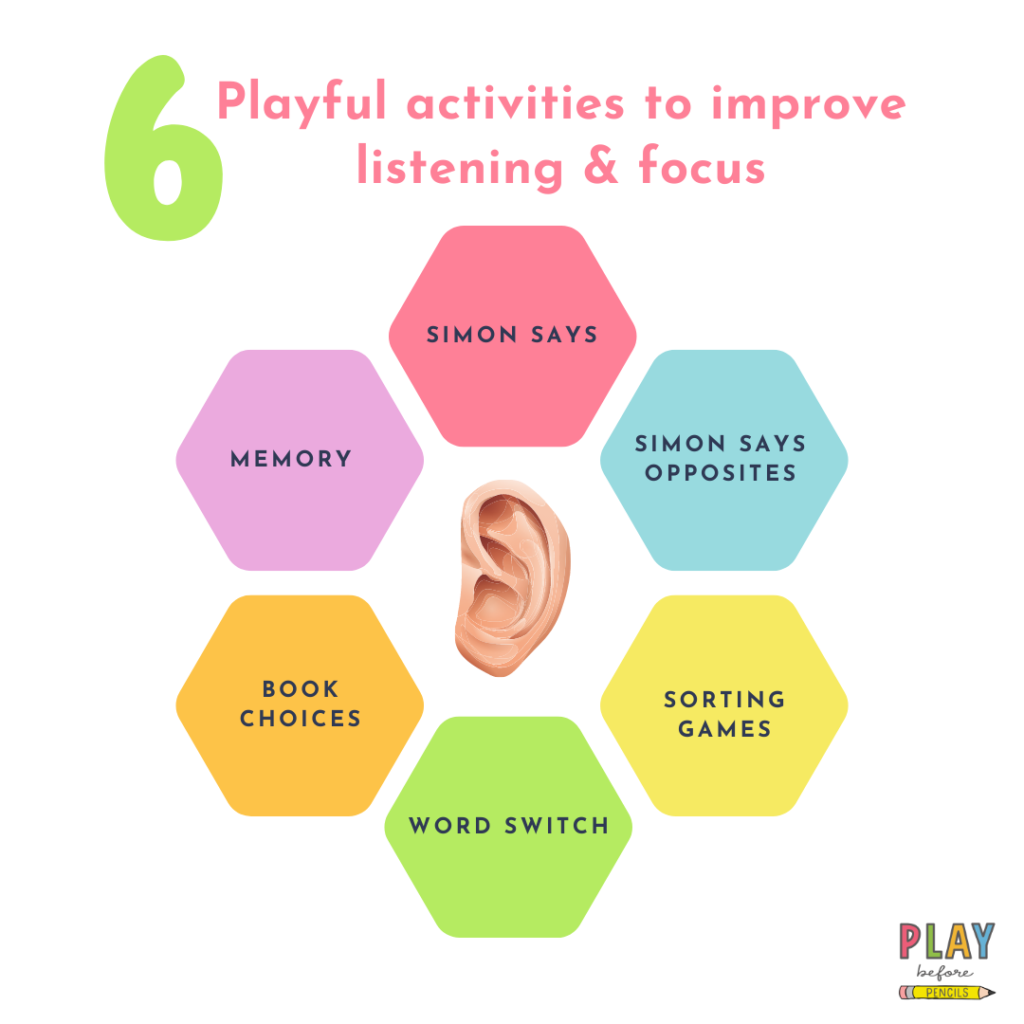I have a little guy in one of my classes this year that is the classic definition of having “ants in his pants”. In a traditional classroom setting, he would be likely to hear the words “Sit down”, “Hold still”, and “Focus!” all day long. Poor kid!
It’s so often assumed that unless a child has their eyes on you and are sitting quietly, they can’t possibly be listening, but that’s simply not true. Part of our job with preschoolers is to help them start refining their listening skills and lengthening their focus, and there are so many playful ways to do it!
Here are 6 simple games you can play throughout your preschool day that help improve focus and listening skills:

Simon Says
This is old classic is one we all know. Kids love taking turns being Simon and catching one another doing an action without being told “Simon Says”. It takes a lot of attention to get it right each time! In addition to focus and listening skills, this is also a great game for improving self-regulation.
Simon Says–Opposites
Add a twist to Simon Says by asking kids to do the opposite action–“Simon says frown” would require kids to smile. Save this for older preschoolers who are ready for a challenge. I have found that most younger preschoolers haven’t quite grasped the concept of opposites enough to get excited about this variation.
Sorting
Asking children to sort items into specific groups requires extra focus. Rather than just tossing handfuls of blocks into a bin during cleanup, have the kids pick up all of the red blocks, then all of the green blocks. Find opportunities during the day where kids can group like items. If you line up to go anywhere, have kids sort themselves into tallest to shortest or by shoes with laces vs. velcro.
Word Switch
When singing a familiar song or reciting a known nursery rhyme, mix the words up or swap out for a wrong word. Kids love catching the teacher being wrong and once they realize what you’re doing, they’ll pay extra attention to find your errors.
Interesting Book Selections
Making book selections based on children’s interests will go a long way toward helping them focus more while being read to. Even a few pages at a time of a chapter book with no pictures will hold the attention of a preschooler if they are engaged in the topic.
Memory
Whether the old card game we all know or a verbal game such as “I’m going on a vacation” where each player must remember a number of the items in order, memory games require great focus and listening in order to stay in the game.
If you aren’t familiar with the game “I’m going on a vacation”, it works like this: The first person starts by saying “I’m going on a vacation, and I’m taking an aardvark” (the sillier the items, the more fun it is). The next person says “I’m going on a vacation, and I’m taking an aardvark and a bumblebee”. The third person repeats the first two items and then adds a third, and so on and so forth. Traditionally, this game is played by choosing items alphabetically–which makes it a great phonemic awareness activity as well, as they try to come up with a word that begins with a certain sound. If that proves too much of a challenge for younger preschoolers, kids can choose any items regardless of what letter they start with.
Listening and focus are two skills that come with age and experience. Allow preschoolers to be preschoolers–there will be fidgeting, there will be talking, there will be rolling around on the floor when you’re trying to give directions. All of those things are OK! They are innate parts of who your kids are at this age.